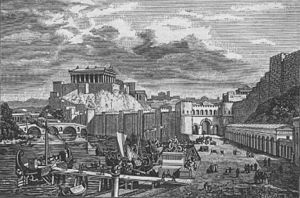Battle of the Porta Collina
| date | November 1, 82 BC Chr. |
|---|---|
| place | Rome in Italy |
| output | Sulla's victory |
| consequences | Sulla's dictatorship |
| Parties to the conflict | |
|---|---|
|
Samnites, popular people |
|
| Commander | |
|
|
|
The Battle of Porta Collina was a skirmish between Optimates and Italians on the side of the Populares during the Roman Civil Wars.
prehistory
Lucius Cornelius Sulla Felix landed in 83 BC. After his victory over Mithridates (see Mithridatic Wars ) in Brundisium (now Brindisi) in what is now Apulia in southeastern Italy. He had an army of 40,000 soldiers under his command and began the second march on Rome . The populars that ruled Italy during Sulla's absence, also based on the Italian Samnites , opposed Sulla, but lost several battles in southern Italy. That year the general Pontius Telesinus had raised a popular army, consisting of Samnites and volunteers whom he had recruited in Lucania and Latium , against Sulla. He tried to stop Sulla's army in Praeneste , but did not arrive there until Sulla was already on the way to Rome . In October 82 BC Then he let his army march back to the walls of Rome in forced marches to prevent an occupation of the city without a fight. On November 1, 82 BC There was a battle.
procedure
Pontius actually came too late, as Sulla's army had already occupied important positions and the Porta Collina (the Collinian Gate was one of the numerous city gates that led through the city wall of Rome). After a long and unsuccessful assault on the city wall, many of the populars left the will to fight, so that many departments withdrew. When Pontius noticed the retreat of his troops, he himself hurried to the front lines and fired his troops again, but was injured by an arrow and remained on the battlefield. Sulla then let the cavalry storm out of the city gate and was able to capture several thousand Samnites, the rest fled from the battlefield. The battle was thus decided.
consequences
After Sulla's victory in the Battle of Porta Collina, he was able to march into Rome with his army and was appointed dictator that same year. This was followed by his reign of terror, with executions and murders on the agenda. After the defeat in this battle in Rome, the Populares basically had no more political power.
Several thousand Samnites and the seriously wounded Pontius Telesinus were in Sulla's captivity, who threw them to eat wild animals in the arena.
literature
- Karl Christ : Sulla. A Roman career . Beck, Munich 2002, ISBN 3-406-49285-1
- Pleticha Schönenberger: Die Römer , Verlag: Bertelsmann, ISBN 3-570-05286-9 , page 308
- Peter Connolly : The Roman Army , Tessloff-Verlag, ISBN 3-7886-0180-9
Individual evidence
- ^ Appian, Civil Wars 1.79.
